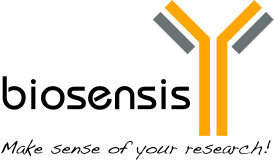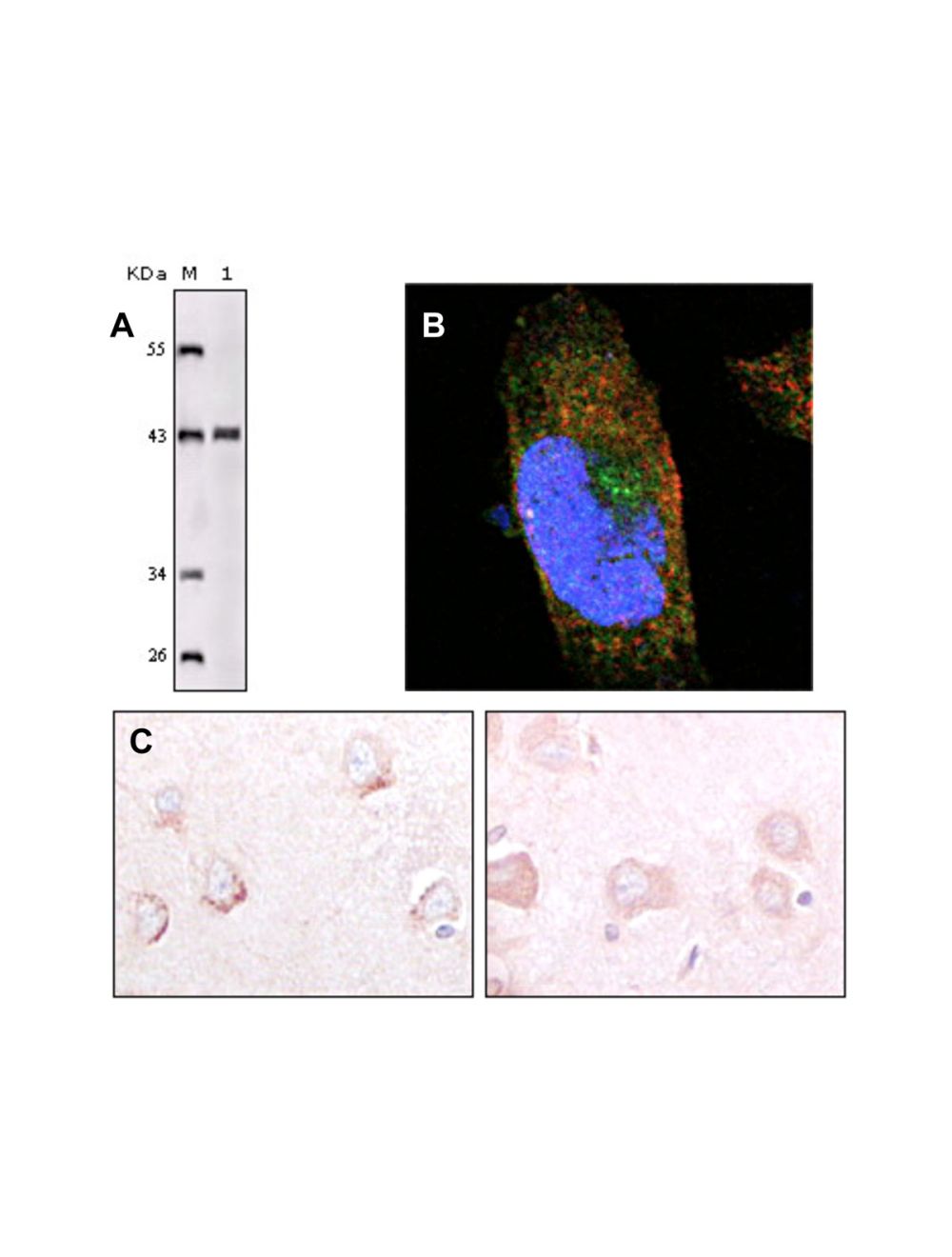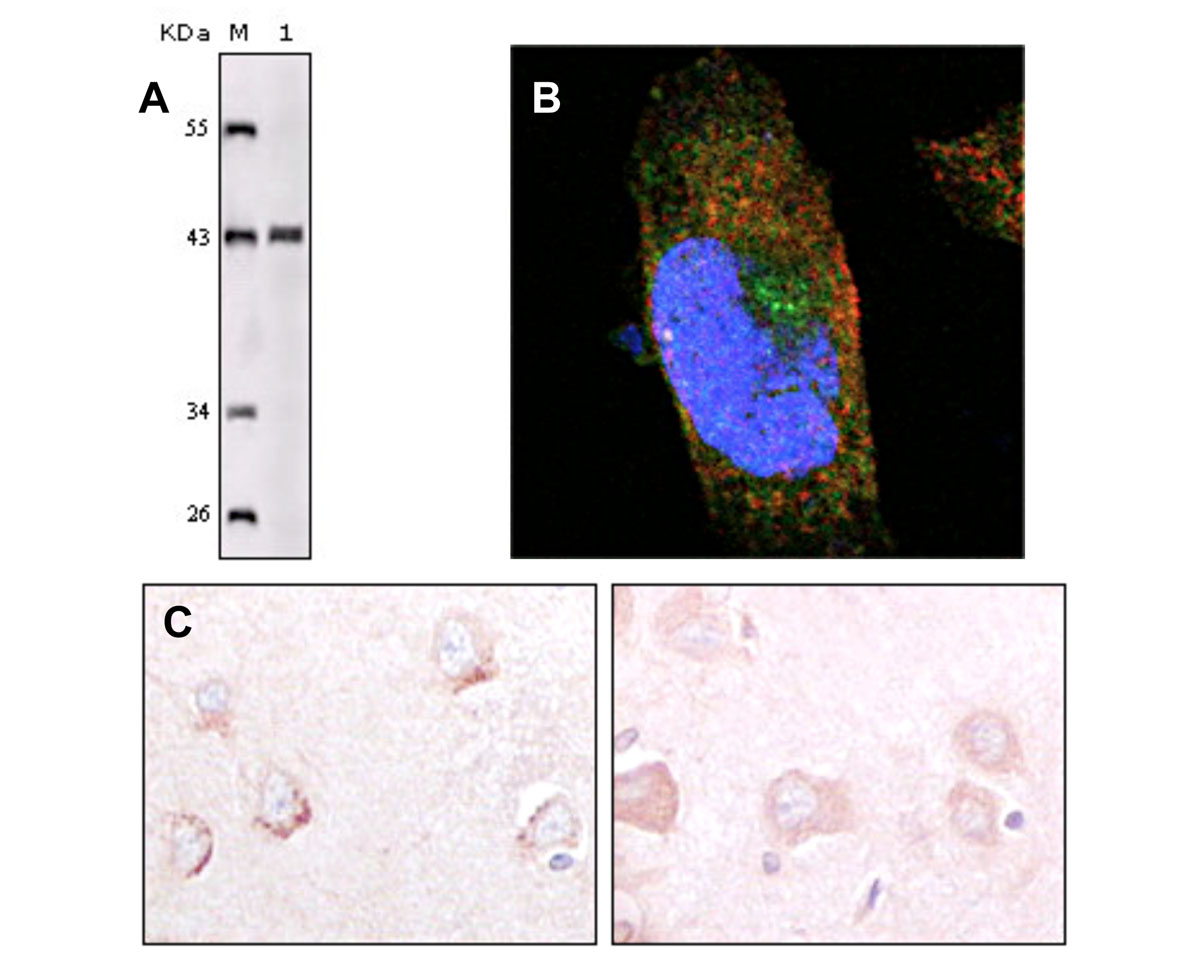Sortilin-related receptor (SorLA/SORL1), Mouse Monoclonal Antibody
Only %1 left
Catalog Number
M-1934
Discontinued
- Product Name Sortilin-related receptor (SorLA/SORL1), Mouse Monoclonal Antibody
- Product Description Mouse anti-Sortilin-related receptor (SorLA/SORL1) Monoclonal Antibody (Unconjugated), suitable for WB, IHC-Paraffin-embedded, ICC.
- Alternative Names Sortilin-related receptor; Low-density lipoprotein receptor relative with 11 ligand-binding repeats; LDLR relative with 11 ligand-binding repeats; LR11; SorLA-11; Sorting protein-related receptor containing LDLR class A repeats; SorLA
- Application(s) ICC, IHC-Paraffin-embedded, WB
- Antibody Host Mouse
- Antibody Type Monoclonal
- Specificity Anti-SorLA SORL1 Monoclonal Antibody validated for WB, IHC, IF, ELISA. Reactive to human, other species not yet tested
- Species Reactivity Human
- Immunogen Description Purified recombinant fragment of human SorLA expressed in E. Coli
- Conjugate Unconjugated
- Purity Description Asciteis Fluid, 0.45 m filtered
- Regulatory Status For research use only.
Product Info
- Product Description Mouse anti-Sortilin-related receptor (SorLA/SORL1) Monoclonal Antibody (Unconjugated), suitable for WB, IHC-Paraffin-embedded, ICC.
- Application(s) ICC, IHC-Paraffin-embedded, WB
- Application Details Western Blotting (1:500-1:2,000), Immunohistochemistry (1:200-1:1,000, use at 1:200 for paraffin-embedded tissues), Immunocytochemistry (1:200-1:1,000) and ELISA (1:10,000). Other applications have not been tested. Biosensis recommends optimal dilutions/concentrations should be determined by the end user.
- Target Sortilin-related receptor (SorLA/SORL1)
- Specificity Anti-SorLA SORL1 Monoclonal Antibody validated for WB, IHC, IF, ELISA. Reactive to human, other species not yet tested
- Target Host Species Human
- Species Reactivity Human
- Antibody Host Mouse
- Antibody Type Monoclonal
- Antibody Isotype IgG
- Clone Name 3B6B11
- Conjugate Unconjugated
- Immunogen Description Purified recombinant fragment of human SorLA expressed in E. Coli
- Purity Description Asciteis Fluid, 0.45 m filtered
- Format Ascitic fluid containing 0.03% sodium azide
- Storage Instructions Spin vial briefly before opening. Divide into aliquots and store at -20°C for long-term storage. Store at 2-8°C short-term (up to 4 weeks). Avoid repetitive freeze/thaw cycles.
- Batch Number Please see item label.
- Expiration Date 12 months after date of receipt (unopened vial).
- Alternative Names Sortilin-related receptor; Low-density lipoprotein receptor relative with 11 ligand-binding repeats; LDLR relative with 11 ligand-binding repeats; LR11; SorLA-11; Sorting protein-related receptor containing LDLR class A repeats; SorLA
- Uniprot Number Q92673
- Uniprot Number/Name Q92673 (SORL_HUMAN)
- Scientific Background The sortilin-related receptor SORLA is an endocytic receptor that belongs to the vacuolar protein sorting 10 (VPS10) domain receptor family. SORLA binds to the amyloid precursor protein (APP). It functions as an intracellular sorting receptor as APP is being trafficked between the secretory pathway, the cell surface, and, subsequently, endosomes. SORLA is localized primarily to the trans-Golgi network and early endosomes, shuttling between these two membrane compartments. SORLA's interaction with APP in endosomal compartments limits the amyloidogenic proteolysis of APP. Reduced brain levels of SORLA are thought to alter the transport and processing of APP to increase generation of Aβ peptides in early or late endosomes. SORLA is highly expressed in the brain. Expression is reported to be normal in familial Alzheimer's disease caused by mutations in presenilin or APP genes, but decreased in some cases of sporadic late-onset AD. In these cases, loss of SORLA activity has been hypothesized to be a proximal cause of amyloidosis. In addition, several private nonsense and missense mutations in SORLA that decrease SORLA levels in the brain were found in rare cases of familial AD. A genetic association of SORLA with AD is well established. Population-based studies initially linked nearly 30 SNPs in SORLA to increased risk of AD, and subsequent studies, meta-analyses, and GWAS have confirmed some of these associations. The genetic data on SORLA and LOAD is complex, with at least six different polymorphisms pointing toward the existence of several causative variants in distinct regions of the gene. Ref: alzforum.org
- Shipping Temperature 2-8°C (on cold packs)
- UNSPSC CODE 41116161
- Regulatory Status For research use only.

 1800 605-5127
1800 605-5127 +61 (0)8 8352 7711
+61 (0)8 8352 7711

